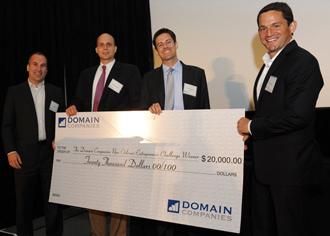Plan to turn algae into oil wins prize at business plan competition
A Freeman School-based venture with a plan to turn algae into crude oil was one of the big winners at Friday’s Tulane Business Plan Competition.

ReactWell, developer of a patent-pending technology that uses underground geothermal reactors to convert biomass into synthetic crude oil, earned the top prize at the second annual Domain Companies New Orleans Entrepreneur Challenge.
The challenge, sponsored by real estate development firm the Domain Cos. and presented in conjunction with the Tulane Business Plan Competition, awards $20,000 in seed capital each year to a high-impact early-stage venture based in New Orleans.
ReactWell founder Brandon Iglesias (MBA ’11, MFIN ’11), who started the company while he was a student at the Freeman School, says the company could generate up to 100 jobs at each of its algae farms if it’s successful in moving forward.
“And those are not short-term jobs,” Iglesias adds. “They’re long term.”
For the judges, that combination of a potentially disruptive technology in the fast-growing alternative fuels market was too good to ignore.
“We were really looking for the business that had the potential to have the greatest impact in New Orleans,” says Matt Schwartz (BSM ’99), co-founder and principal of the Domain Cos., who served as a judge in the competition. “At the end of the day, we felt the biggest impact would come from ReactWell.”
In the Tulane Business Plan Competition, Calcula, a company based at Stanford University, earned the grand prize of $50,000 with its plan for a medical device that enables doctors to remove small kidney stones in an office setting without the use of general anesthesia. Therapies have long been available for patients with kidney stones larger than 10 millimeters, but for patients with small kidney stones, the only recourse has been to pass the stone naturally, which can be extremely painful.

“I think what’s great about our device is it not only saves the patient from pain by removing kidney stones when they wouldn’t otherwise get them removed, but if you look at the saved ER visits, narcotics and employer payers—because these patients miss so many days of work with these recurring episodes of renal colic—we really save the system money as well,” says Calcula’s Buzz Bonneau, who helped present the team’s plan. “It works for everybody.”
Competition judge E. Pierce Marshall Jr. (BSM ’90) says the device’s wide range of benefits to stakeholders was appealing.
“There’s clearly a significant unmet need among a very large portion of the population with kidney stones,” Marshall says. “Calcula demonstrated that their device would be attractive to doctors, patients, insurers and, ultimately, if they can achieve the margin figures they’re talking about, shareholders as well.”
Of the six finalists in this year’s competitions, two originated at Tulane: ReactWell and Tulane Business Plan Competition finalist SODI-CAN, which pitched its plan to manufacture a storage can for distribution in developing countries that disinfects water using solar energy.
“I think what impressed me more that simply having two finalists from Tulane in the competitions was that both the Tulane finalists embody ideas we’re striving to instill in students,” says Ira Solomon, business school dean. “Whether the ventures are based at the business school, the medical school or elsewhere, we’re seeing more and more students applying business principles to tackle some of society’s most vexing problems, and that’s a good thing for everyone.”
Interested in advancing your education and/or career? Learn more about Freeman’s wide range of graduate and undergraduate programs. Find the right program for you.
Other Related Articles
- Politico: Trump administration moves closer to opening Venezuela to more US oil producers
- Alumna leverages Freeman network to land dream job at Entergy
- NOLA.com: Louisiana venture capital firms, once an afterthought, are big funders of local startups now
- Forbes: Your Pitch Deck Doesn’t Close the Deal - Your Power in the Room Does
- New Orleans startups bet on AI as Tulane expands its survey statewide in 2026
- Alum launches fund to invest in Tulane-affiliated startups
- Jobs fuel growth of MME program
- Tulane Energy Institute gets major gift from Templeton family, new name for Trading Center
